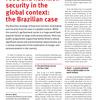Food and nutrition security in the global context: the Brazilian case
The Brazilian strategy of food and nutrition security must be seen in a global context. While the country's agribusiness sector is a huge food exporter to the world markets, the Brazilian government is supporting the expansion of family farmers with significant social and environmental impacts. These strategies are also a response to the challenges of four crises that the world is faced with: beside the world food crisis, there are the economic, environmental and energetic crises.
Internationally, Brazil has gained much attention for its successful poverty and hunger reduction model, put in place under the Lula administration since 2003. The new government, led by President Dilma Roussell, has declared the eradication of extreme hunger as its chief social priority. A national plan for food and nutrition security will be launched by mid-2011.
Renato S. Maluf
President of the National Council on Food and Nutrition Security (CONSEA) and
Professor at the Social Sciences Graduate Programme in Development, Agriculture and Society Federal Rural University of Rio de Janeiro
Rio de Janeiro, Brazil
renato.maluf@terra.com.br




